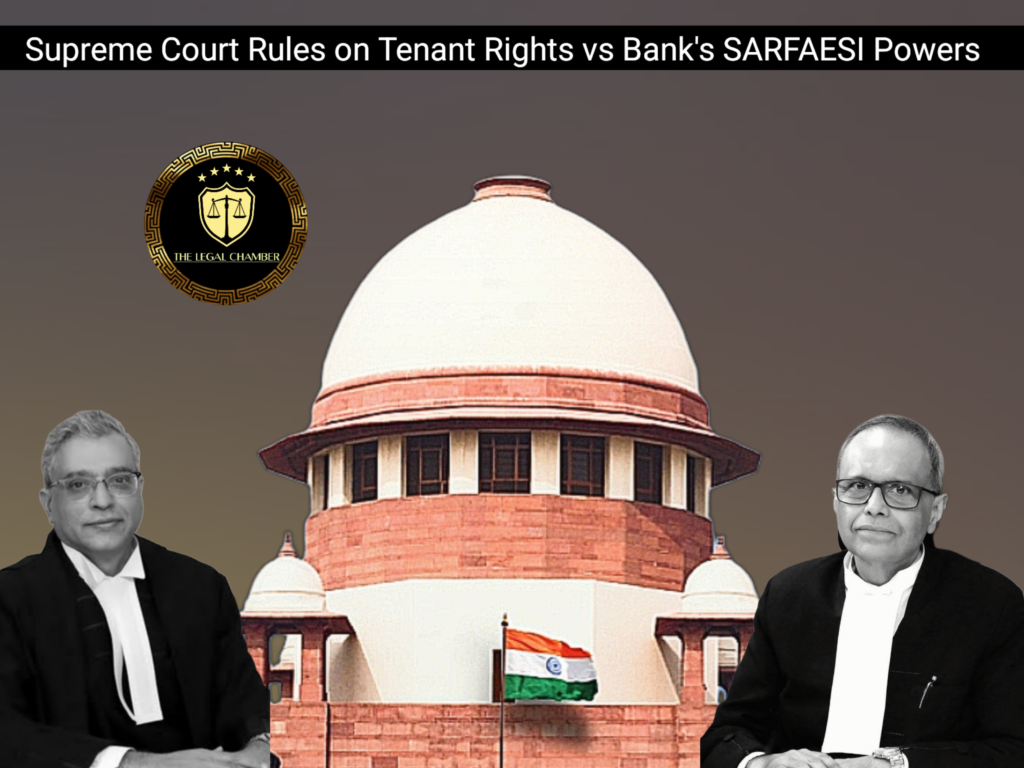
The Supreme Court held that tenants claiming rights under unregistered agreements cannot override SARFAESI proceedings. Relying on Bajarang Shyamsunder Agarwal, it ruled that oral/unregistered tenancies cannot extend beyond one year post-Section 13(2) notice. The Court emphasized that tenants must prove prior lawful possession with documentary evidence and barred High Courts from interfering under Article 227 when statutory remedies under SARFAESI exist. The judgment reaffirms the primacy of secured creditors’ rights over unsubstantiated tenancy claims.
Facts Of The Case:
The case involved a dispute between PNB Housing Finance Limited (Appellant) and Sh. Manoj Saha (1st Respondent) over the possession of a secured asset—a 450 sq. ft. space in Kolkata. The 1st Respondent claimed to be a tenant since 1987 under an unregistered lease agreement with the original landlord, M/s Janapriya Finance. After the lease expired in 1992, he alleged he continued as a monthly tenant. In 2007, the property was sold to the 2nd Respondent, who issued an attornment notice in 2008, demanding rent.In 2017, the 2nd Respondent mortgaged the property to PNB Housing Finance for a loan, which later turned into an NPA. The bank issued a demand notice under SARFAESI in 2021 and took symbolic possession. Despite publication in newspapers, the 1st Respondent did not raise objections. Later, the bank obtained physical possession through the District Magistrate. Only then did the 1st Respondent claim tenancy rights and seek restoration of possession before the DRT, which rejected his plea due to lack of documentary evidence.The High Court, under Article 227, directed possession be restored, but the Supreme Court overturned this, ruling that unregistered tenancies do not prevail over SARFAESI proceedings and that statutory remedies under the Act must be exhausted first.
Procedural History:
The case originated when PNB Housing Finance Limited initiated recovery proceedings under the SARFAESI Act after the borrower defaulted on loans secured against the property. The bank issued a demand notice under Section 13(2) in July 2021, took symbolic possession in December 2021, and later obtained physical possession through the District Magistrate in August 2023. The 1st Respondent (claiming tenancy) filed a securitization application before the Debt Recovery Tribunal (DRT), which rejected his interim plea, noting the lack of documentary evidence to prove a valid tenancy.The 1st Respondent then approached the Calcutta High Court under Article 227 of the Constitution, which set aside the DRT’s order and directed restoration of possession, citing the tenant’s prima facie occupation rights. PNB Housing Finance appealed to the Supreme Court, which overturned the High Court’s decision, holding that the High Court should not have interfered given the statutory remedy available under Section 18 of SARFAESI. The Supreme Court emphasized that unregistered tenancies cannot override secured creditors’ rights and remanded the matter to the DRT for final disposal within two months.
READ ALSO :Conspiracy in Construction: Supreme Court Slams Builder & Officials for Violating Zoning Rules
Court Observation:
The Supreme Court made several key observations in its judgment. Firstly, it emphasized that the High Court erred in entertaining the petition under Article 227 when a statutory remedy under Section 18 of SARFAESI Act was available to the tenant. The Court reiterated its consistent view that High Courts should refrain from interference in SARFAESI matters when alternative remedies exist.On the substantive issue, the Court observed that an unregistered tenancy agreement cannot create rights that override the secured creditor’s claims under SARFAESI. Relying on precedents like Bajarang Shyamsunder Agarwal, it held that oral/unregistered tenancies cannot continue beyond one year from the issuance of a Section 13(2) notice. The Court noted that the tenant failed to produce convincing documentary evidence (like rent receipts or utility bills) to substantiate his claim of continuous possession prior to the SARFAESI proceedings.The judgment clarified that while rent control laws protect tenants, they cannot be used to frustrate the recovery process under SARFAESI when the tenancy claims lack proper evidentiary support. The Court also criticized the tenant’s delayed response to possession notices, viewing it as indicative of a weak claim. Ultimately, it upheld the primacy of banks’ recovery rights while balancing them against genuine tenancy rights supported by documentary proof.
Final Decision & Judgement:
The Supreme Court allowed the appeal filed by PNB Housing Finance Limited and set aside the Calcutta High Court’s order directing restoration of possession to the alleged tenant. The bench comprising Justices Pamidighantam Sri Narasimha and Joymalya Bagchi held that the High Court had erroneously interfered under Article 227 when statutory remedies under SARFAESI were available. The Court ruled that the 1st Respondent failed to establish a valid tenancy through proper documentary evidence, particularly noting the absence of rent receipts or utility bills predating the SARFAESI proceedings. Reaffirming the principles laid down in Bajarang Shyamsunder Agarwal, the judgment emphasized that unregistered tenancies cannot prevail over secured creditors’ rights under SARFAESI. The Court directed maintenance of status quo regarding possession until the DRT disposes of the pending securitization application, which it ordered to be decided within two months without unnecessary adjournments. The judgment reinforced the primacy of banks’ recovery rights while acknowledging that genuine tenancies with proper documentation would receive protection under the law. All pending applications were disposed of accordingly.
Case Details:
Case Title: PNB Housing Finance Limited vs. Sh. Manoj Saha & Anr. Citation: 2025 INSC 847 Appeal No.: SLP (C) No. 7288 of 2024 Date of Judgment: July 15, 2025 Judges/Justices:Justice Pamidighantam Sri Narasimha & Justice Joymalya Bagchi
Download The Judgement Here